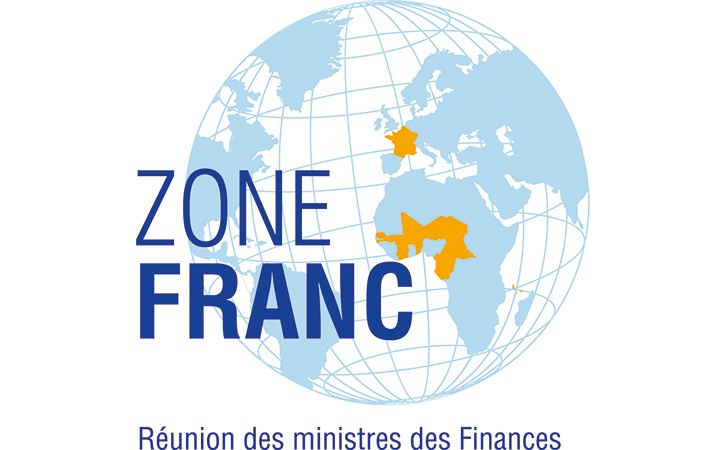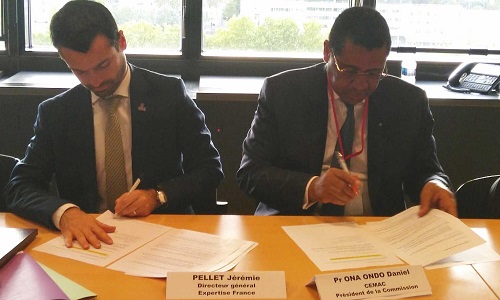An Expertise France study presented at the meetings of Finance Ministers of the Franc zone
 The meetings of the Finance Ministers of the Franc zone* provide the opportunity to hold discussions twice a year on subjects such as the state of convergence in the Franc zone, the macroeconomic situations and prospects in the zone and the issues and challenges facing countries in the subregion: improving the mobilisation of domestic public resources, public-private partnerships (PPPs) and the fight against money laundering and terrorist financing (AML/CFT).
The meetings of the Finance Ministers of the Franc zone* provide the opportunity to hold discussions twice a year on subjects such as the state of convergence in the Franc zone, the macroeconomic situations and prospects in the zone and the issues and challenges facing countries in the subregion: improving the mobilisation of domestic public resources, public-private partnerships (PPPs) and the fight against money laundering and terrorist financing (AML/CFT).
Expertise France study on training financial administrations
During the RMZF held in Niamey on 28 March 2019, participants reiterated the importance of rapidly and substantially improving the mobilisation of domestic resources and welcomed the prospect of a study on training for financial administrations, commissioned by the Commission of the West African Economic and Monetary Union (WAEMU) and launched by AFD.
This study has been entrusted to Expertise France and has been conducted in the 8 member countries of the subregion (Benin, Burkina Faso, Côte d'Ivoire, Guinea-Bissau, Mali, Niger, Senegal and Togo). The objective was to analyse the extent to which current training systems meet the needs of tax and customs administrations, whose activities are undergoing substantial changes as a result of globalisation and the digitalisation of the economy in a context of regional integration.
The initial findings and areas for improvement, which were presented and discussed during the experts’ meeting on 10 October, could serve as a basis for a regional action plan to modernise the initial and continuous training policy for customs and tax officers responsible for mobilising domestic public resources.
Public-Private Partnerships in the Franc zone: review of the first phase of the project
The meetings of the Ministers were also an opportunity for the Chief Executive Officer of Expertise France to present a review of phase 1 of the France-World Bank initiative on Public-Private Partnerships (PPPs) in the Franc zone launched in the WAEMU area in 2013.
The objective of this project, which was financed by the General Directorate of the Treasury, was to promote the implementation of PPP projects to develop infrastructure and public services, in particular by supporting the development of a legal and institutional framework in line with international best practices.
In this context, Expertise France has assisted the WAEMU Commission with the development of a Strategy to regulate PPPs, which has now been finalised. A WAEMU draft directive will be adopted shortly. A new support phase for 2019-2021, financed by AFD, will focus on technical assistance for the transposition of the directive in the eight member countries and support for a pilot project.
For further reading: Brazil: French expertise mobilised for the development of PPPs
Signing of a partnership agreement with the CEMAC Commission
 The meeting also gave Expertise France the opportunity to sign a France partnership agreement with the CEMAC Commission (Central African Economic and Monetary Community), which aims to extend the PPP Initiative to the subregion.
The meeting also gave Expertise France the opportunity to sign a France partnership agreement with the CEMAC Commission (Central African Economic and Monetary Community), which aims to extend the PPP Initiative to the subregion.
When it is properly regulated, recourse to private financing to create public infrastructure is a relevant driver. It is complementary to the mobilisation of domestic public resources in order to address the development challenges facing Africa.
 Find out more on the website of the Ministry of the Economy and Finance
Find out more on the website of the Ministry of the Economy and Finance
*The Franc zone includes France and fourteen Sub-Saharan African countries: Benin, Burkina Faso, Côte-d'Ivoire, Guinea-Bissau, Mali, Niger, Senegal and Togo (in West Africa), Cameroon, Central African Republic, Chad, Congo, Equatorial Guinea and Gabon (in Central Africa), and the Comoros.

